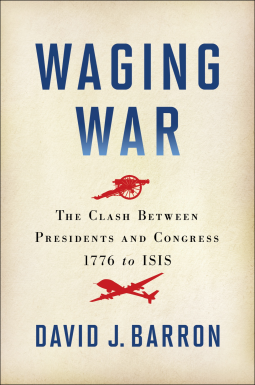
Waging War
The Clash Between Presidents and Congress, 1776 to ISIS
by David J. Barron
This title was previously available on NetGalley and is now archived.
Buy on Amazon
Buy on BN.com
Buy on Bookshop.org
*This page contains affiliate links, so we may earn a small commission when you make a purchase through links on our site at no additional cost to you.
Send NetGalley books directly to your Kindle or Kindle app
1
To read on a Kindle or Kindle app, please add kindle@netgalley.com as an approved email address to receive files in your Amazon account. Click here for step-by-step instructions.
2
Also find your Kindle email address within your Amazon account, and enter it here.
Pub Date Oct 04 2016 | Archive Date Oct 04 2016
Description
“Vivid…Barron has given us a rich and detailed history.” —The New York Times Book Review
“Ambitious...a deep history and a thoughtful inquiry into how the constitutional system of checks and balances has functioned when it comes to waging war and making peace.” —The Washington Post
A timely account of a raging debate: The history of the ongoing struggle between the presidents and Congress over who has the power to declare and wage war.
The Constitution states that it is Congress that declares war, but it is the presidents who have more often taken us to war and decided how to wage it. In Waging War, David J. Barron opens with an account of George Washington and the Continental Congress over Washington’s plan to burn New York City before the British invasion. Congress ordered him not to, and he obeyed. Barron takes us through all the wars that followed: 1812, the Mexican War, the Civil War, the Spanish-American war, World Wars One and Two, Korea, Vietnam, Iraq, and now, most spectacularly, the War on Terror. Congress has criticized George W. Bush for being too aggressive and Barack Obama for not being aggressive enough, but it avoids a vote on the matter. By recounting how our presidents have declared and waged wars, Barron shows that these executives have had to get their way without openly defying Congress.
Waging War shows us our country’s revered and colorful presidents at their most trying times—Washington, Lincoln, Theodore Roosevelt, Franklin Roosevelt, Truman, Eisenhower, John F. Kennedy, Johnson, both Bushes, and Obama. Their wars have made heroes of some and victims of others, but most have proved adept at getting their way over reluctant or hostile Congresses. The next president will face this challenge immediately—and the Constitution and its fragile system of checks and balances will once again be at the forefront of the national debate.
“Ambitious...a deep history and a thoughtful inquiry into how the constitutional system of checks and balances has functioned when it comes to waging war and making peace.” —The Washington Post
A timely account of a raging debate: The history of the ongoing struggle between the presidents and Congress over who has the power to declare and wage war.
The Constitution states that it is Congress that declares war, but it is the presidents who have more often taken us to war and decided how to wage it. In Waging War, David J. Barron opens with an account of George Washington and the Continental Congress over Washington’s plan to burn New York City before the British invasion. Congress ordered him not to, and he obeyed. Barron takes us through all the wars that followed: 1812, the Mexican War, the Civil War, the Spanish-American war, World Wars One and Two, Korea, Vietnam, Iraq, and now, most spectacularly, the War on Terror. Congress has criticized George W. Bush for being too aggressive and Barack Obama for not being aggressive enough, but it avoids a vote on the matter. By recounting how our presidents have declared and waged wars, Barron shows that these executives have had to get their way without openly defying Congress.
Waging War shows us our country’s revered and colorful presidents at their most trying times—Washington, Lincoln, Theodore Roosevelt, Franklin Roosevelt, Truman, Eisenhower, John F. Kennedy, Johnson, both Bushes, and Obama. Their wars have made heroes of some and victims of others, but most have proved adept at getting their way over reluctant or hostile Congresses. The next president will face this challenge immediately—and the Constitution and its fragile system of checks and balances will once again be at the forefront of the national debate.
Available Editions
| EDITION | Other Format |
| ISBN | 9781451681970 |
| PRICE | $30.00 (USD) |



